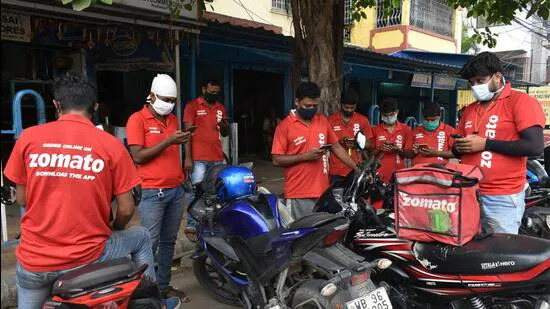The Rajasthan Platform-Based Bill
Context:
The Rajasthan government introduced the Rajasthan Platform-Based Gig Workers (Registration and Welfare) Bill, 2023, aimed at securing social security for gig workers.
Relevance:
GS – 03 (Industrial Policy, Issues Relating to Development, Government Policies & Interventions)
Prelims:
- Code on Wages
- Code on Social Security
Mains Question:
- Discuss the challenges and opportunities posed by the rise of gig economy and gig workers in the contemporary society. 250 words.
Dimensions of the Article:
- The Grey Area of Gig Worker Status
- A Potential Lacuna in Labor Law Integration
- The Persistent Registration Predicament
- Social Security Safeguard
The Grey Area of Gig Worker Status:
- The foremost issue arises from the definitions of gig workers and aggregators outlined in the Bill. Drawing heavily from the Code on Social Security, 2020, the Bill classifies gig workers as individuals engaged in work arrangements beyond traditional employer-employee relations, earning income from such activities. Meanwhile, an aggregator is identified as a digital intermediary that collaborates with one or more aggregators to provide services.
- However, these definitions lack clarity and definitive guidance on treating aggregators as employers. This ambiguity is pivotal, as it influences whether gig workers are perceived as contractors or self-employed individuals rather than employees under aggregators.
- The global debate on whether gig workers should be classified as employees has sparked complexities. The ABC Test, integral to California’s labor code, hinges on determining if gig workers qualify as employees rather than independent contractors. This test arose from a case involving Dynamex’s delivery drivers and requires companies to demonstrate that workers have autonomy over work performance, hours, etc. Should companies fail to do so, full employee benefits must be extended to gig workers.
- The U.K. Supreme Court similarly ruled that Uber drivers should be treated as workers, not self-employed, emphasizing clarity in categorization. In contrast, the Rajasthan Bill presents ambiguous definitions open to conflicting interpretations. This divergence from global best practices fuels the second critical issue.
A Potential Lacuna in Labor Law Integration:
- By not defining gig workers as employees, the Bill falls short in incorporating existing labor laws within its framework. Consequently, aggregators may remain exempt from complying with labor law mandates, avoiding responsibilities for providing workplace benefits to gig workers. In 2022, prominent Indian platforms received zero ratings in Fairwork India’s assessment. If gig workers are not employees, the extent of aggregators’ liability for workplace accidents and medical expenses while on duty remains uncertain.
- While some Indian platforms address this concern, this approach risks turning essential entitlements like occupational safety into acts of benevolence by aggregators. Australia and New Zealand adopted language shifts, referring to ‘persons conducting a business or undertaking’ and ‘workers in their workplaces’ instead of ’employers’ or ’employees.’ This places the responsibility on businesses to ensure worker safety both on-site and elsewhere during work.
The Persistent Registration Predicament:
- The Bill intends to establish a database of gig workers, containing information on workers associated with platforms. However, this database’s permanence without considering engagement duration poses potential issues.
- Gig workers often serve multiple aggregators in a single day. Mandatory registration may allow aggregators to access worker employment details across platforms, possibly affecting gig workers’ flexibility. The Bill lacks mechanisms to mitigate such challenges.
Social Security Safeguard:
- Central to the Bill’s objective is securing social security for gig workers via a welfare board and fund. The Bill encompasses eight aggregators or primary employers-based services. However, it omits precise definitions for social security and welfare measures, leaving this interpretation to the welfare board’s discretion.
- The board, empowered to devise and notify social security schemes, is nominated by the State government. Yet, the influence of powerful representatives from platforms, bureaucracy, and government raises questions about the board’s efficacy.
Conclusion:
As the Rajasthan government endeavors to pioneer gig worker welfare through the Bill, potential impediments must be acknowledged. By addressing the identified concerns, aligning with international precedents, and adopting comprehensive provisions, the Bill can evolve into a potent tool to safeguard the interests of gig workers.





